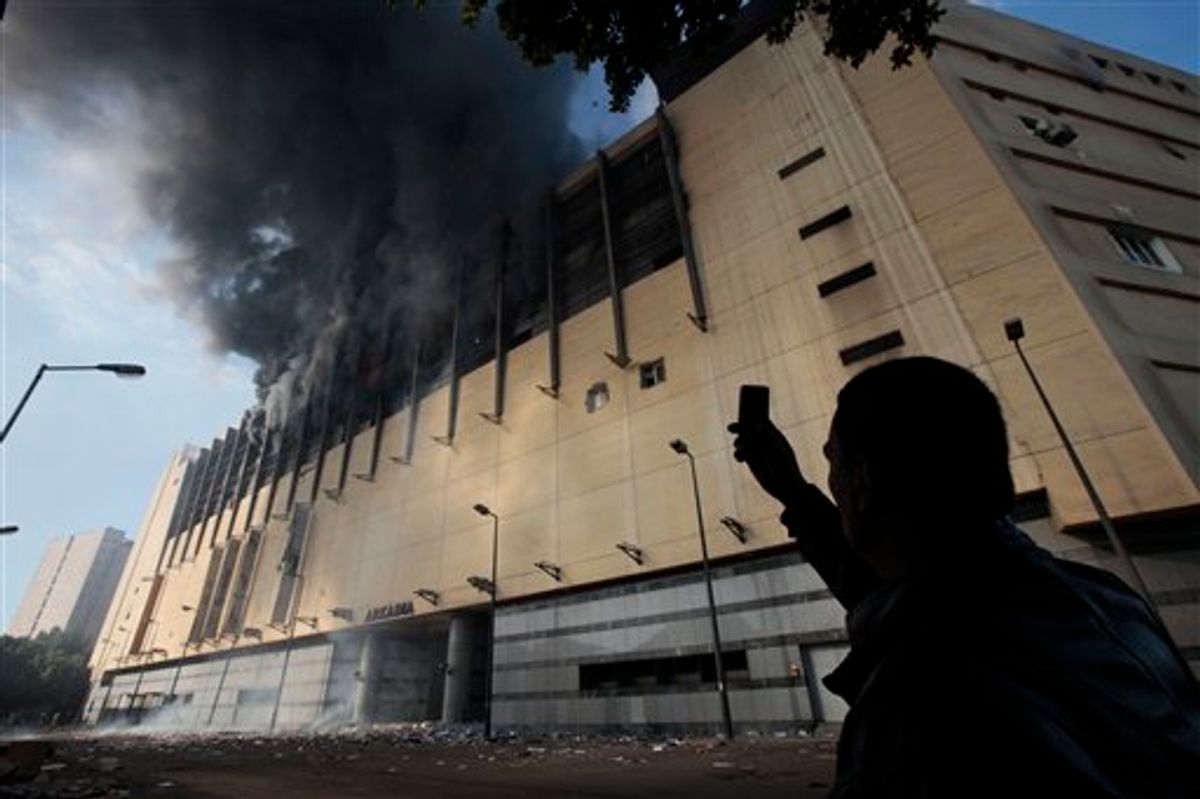After 24 years in Canada, Rafik and Leila Baladi moved back to Cairo two weeks ago to settle down.
Now, like many other residents of the Egyptian capital, they're stocking up on bottled water and essential foodstuffs as chaos engulfs this sprawling city of some 18 million.
"We just don't know what is going to happen," said Leila, who along with her husband was pushing a shopping cart loaded with frozen chicken breasts, fava beans, milk and other items at a grocery store in central Cairo. "People are terrified to death."
Everyday life in Cairo has been turned upside down by the largest anti-government protests in decades in Egypt, which began last Tuesday and have surged since.
Schools are closed and businesses boarded up; the usual bumper-to-bumper traffic is now little more than a trickle; and the capital's famed nightlife has been snuffed out by a 4 p.m. to 8 a.m. curfew. For Monday, the military extended the hours, saying curfew would start at 3 p.m.
Even the Internet and text message services have been blocked for days.
The overriding concern for almost everyone in Cairo remains the fear of lawlessness.
"There's no cash in the ATMs, there's something like 5,000 prisoners roaming the streets and there's no security," said May Sadek, a public relations agent who lives in the middle class Dokki neighborhood. There have been jail breaks from at least four prisons around Cairo in recent days.
The police, which before the revolt could be seen on nearly every corner, melted away Friday, giving way to looting and arson. Gangs of thugs have cleared out supermarkets, shopping malls and stores, as well as luxury homes and apartments in affluent residential areas in the suburbs. On Monday, police were beginning to redeploy in many neighborhoods.
But in the meantime, young men stepped in to fill the vacuum left by the police, setting up neighborhood defense committees armed with guns, clubs and knives to protect their families and property. Groups of youths also directed traffic in parts of Cairo, chasing away the gangs of criminals smashing passing cars.
Naglaa Mahmoud, a 37-year-old homemaker, said she and her two sons spent a sleepless night Saturday at their home in the upscale Maadi neighborhood in south Cairo because of the crackle of gunfire outside and the fear of looters.
"We couldn't sleep," she said. "My husband and brother went downstairs with sticks to fend off the thugs. ... My kids finally dozed off by dawn. They were frightened by the sound of the bullets."
With the protests dragging on and no immediate end in sight, people are scrambling to buy up the basic supplies to wait things out.
At grocery stores across the city, people stocked up on food, water and other supplies Sunday. Stores in the neighborhoods of Zamalek, Mohandiseen and Dokki were running short of many items, especially bread and bottled water. At one store, water was selling for three times the normal rate.
But with banks closed and many ATMs out of cash, some are already feeling a pinch in their pocketbook.
"We can't get any money out and we have less than 1,000 pounds ($170) in cash at the moment so we're buying what we can now and we'll try to get by," said Rafik Baladi, a 59-year-old musician and writer.
Across the capital, work has all but come to a standstill. Downtown, where the protests are centered, nearly all shopfronts are shuttered and windows either boarded up or painted over. Across the Nile in Dokki, only a smattering of pharmacies, coffee shops and eateries were open for business.
"Since Tuesday, it's just been about the demonstrations, not about anything else," said Selma Abou Dahab, a 36-year-old lifestyle manager for a multinational company. "We're being covered by our international offices because we can't work without the Internet."
The government cut off access to the Internet across the country early Friday morning. Cell phone service was also suspended in some areas.
Abou Dahab said the cutoff has been as big a hassle as anything.
"It's a big deal for everybody," she said. "It's just like they're stuffing socks down our throats."
Despite the headaches, disruptions, fears and frustrations residents appear digging in.
"This is the first time we've been in a situation like this," said Yassin Gadelhak, a 26-year-old real estate agent and friend of Sadek. "It's not totally a question of how long we can hold out, but rather a question of how long they (Mubarak's government) can hold out."
------
Associated Press writer Sarah El Deeb contributed to this report.



Shares